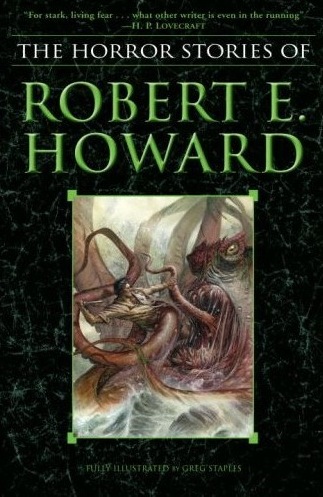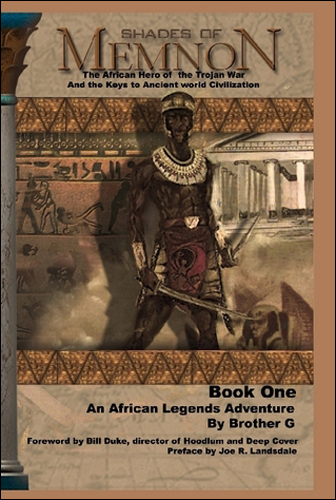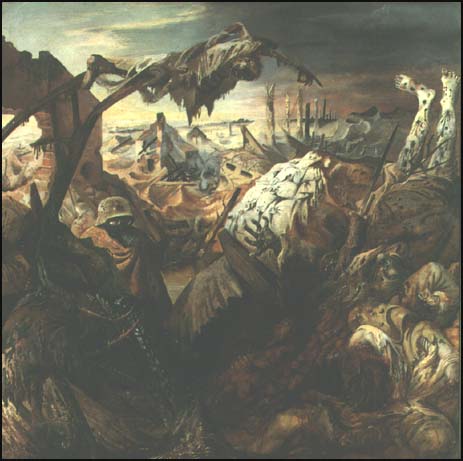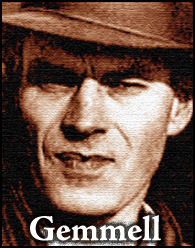Friday, November 21, 2008
posted by Steve Tompkins
Howardists’ Howardist Charles Hoffman turns in an Amazonian review of The Collected Horror Stories of Robert E. Howard. He’s none too affrighted by “Rattle of Bones” (for my part I don’t think “Delenda Est” is classifiable as a horror story unless one is on the payroll of the late-period Roman Empire) and sticks up for the excluded “The Hyena,” “Black Wind Blowing,” and especially “The People of the Black Coast.” I tried to push that story hard in a TC essay back in February, but it seems that “People” is a rare blind spot for His Editorial Excellency Rusty Burke; perhaps he’s simply dined too well on too many crabmeat dinners over the years to accept the crustaceans’ oversized and supersapient brethren as a credible threat.
Today is of course Black Friday for those of us who unswooningly prefer the gore-and-gravedirt-reeking, hemoglobin-slurping, food-chain-topping undead of yester-fiction, so it’s great to see Hoffman plugging The Collected Horror Stories at the expense of “contemporary horror…recently dominated by chicks’ overheated erotic fantasies about their imaginary vampire boyfriends.” I don’t think Del Rey did themselves any favors in terms of imprinting a strong visual identity for each REH collection this time, though. Here’s the Greg Staples tentacular spectacular that for months was the front runner for front cover:

Instead they went with this:
(Continue reading this post)
Wednesday, November 12, 2008
posted by Leo Grin

Charles Saunders has posted some new material to his website of interest to fans of fantasy and historical fiction.
First, for the politically minded there’s Chuck’s detailed thoughts on the recent election, from the perspective of a black North American fantasist intimately engaged in furthering appreciation of African culture, legendry, history, and dealing with what he ominously calls “The Legacy.” Worth a read, if you are so inclined.
More on point for this blog is Saunders’ review of a new series of historical fiction, one that furthers the inroads that Saunders himself pioneered with his creation and defining of what’s come to be known as “Sword-and-Soul” fiction. Brother G (pen name for Gregory L. Walker) has taken Greek mythology, quest narratives, ancestral memories, and loads of original Afrocentric worldbuilding rooted in ancient history, and used them to create a rip-roaring adventure that at times literally spans the world. Sounds very promising, with what sounds like hearty helpings of Howardian-style storytelling in the mix. I’m looking forward to reading them. You can buy them yourself here:
Book 1: Shades of Memnon
Book 2: Ra Force Rising
Book 3: African Atlantis Unbound
Steve adds: I note from Charles’ review that Memnon’s adventures come to us via “the framing device of the ancestral memories of a contemporary African-American man in a coma after a serious accident.” At this late date Walker didn’t necessarily borrow the framing device from REH or Jack London, but it’s cool to see the technique being de-mothballed.
Tuesday, November 11, 2008
posted by Steve Tompkins

It’s been ninety years since “the eleventh hour of the eleventh day of the eleventh month” of 1918 on the Western Front, and very soon now recalled or recollected history will give way entirely to history that is merely recorded. My thoughts never require much encouragement to run to World War One, and this morning two “holiday”-themed pieces got me musing about remembrance and the conflict that murdered illusions and mothered ironies, the distant Armageddon of Robert E. Howard’s childhood. In “Photographer Races Clock to Honor Last Few World War I Vets” Mark Bixier and Paula Hancocks describe the commemorative efforts of one David De Jonge, who’s driven by his awareness of “the last breaths of the last souls who witnessed one of the most horrific wars this world has ever seen.” By his painstakingly researched count, only ten veterans — of any Great War army — still survive:
Four live in Britain, two in Australia, two in France and two in the United States: Buckles and 108-year-old John Babcock of Spokane, Washington, who served with Canadian forces during World War I, DeJonge said.
Each week or month that passes, it seems, brings news of an aging veteran succumbing before DeJonge can find the time and money to photograph him.
Not long ago, he said, two Jamaicans who fought with the British during World War I died. The last known German, French and Austro-Hungarian veterans died in the last year as well.
“These are the last of the last,” he said.
(Continue reading this post)







